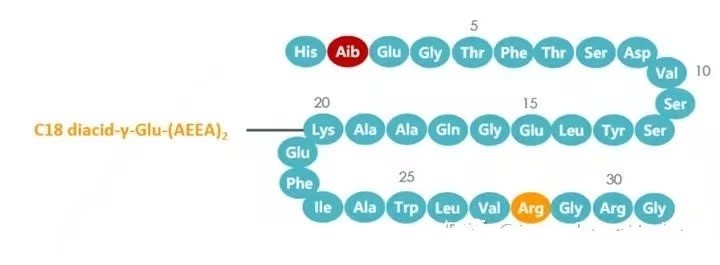Retatrutide vs Semaglutide Which is Better?

Obesity is a global pandemic, with the World Health Organization (WHO) estimating that 13% of adults worldwide suffer from obesity. More importantly, obesity will further cause metabolic syndrome and various complications, such as type 2 diabetes, hypertension, nonalcoholic steatohepatitis (NASH), cardiovascular disease and cancer.
Glucagon like receptor agonists (GLP-1RA) are a class of multi potent hypoglycemic drugs, which play a variety of beneficial effects on type 2 diabetes patients by activating the glucagon like peptide-1 receptor in multiple organs or tissues of the human body. Retatrutide VS Semaglutide are both GLP-1 receptor agonists, and their mechanisms of action are similar, but there are differences in some details:
Semaglutide: GLP-1 receptor agonist, pioneering the world of miracle peptide drugs
Semaglutide is a GLP-1 receptor agonist developed by Novo Nordisk, a leader in the field of diabetes treatment. This drug can increase glucose metabolism by stimulating pancreatic beta cells to secrete insulin; And inhibit pancreatic alpha cells from secreting glucagon, reducing fasting and postprandial blood glucose. In addition, Semaglutide can also reduce food intake by lowering appetite and slowing down stomach digestion, ultimately reducing body fat, which is beneficial for weight loss.
In a global large-scale clinical trial published in the NEJM journal in February 2021, subcutaneous injection of 2.4mg semaglutide per week resulted in an average weight loss of 15kg. Three quarters of the population lost more than 10% of their weight, and over one-third lost more than 20% of their weight.

On March 24, 2023, Novo Nordisk oral version of semaglutide reached the phase III clinical endpoint. Patients taking a high dose (50mg) orally once a day showed a 2.0% decrease in glycated hemoglobin (HbA1c) and a weight loss of 8.0kg after one year.
It can be seen that GLP-1 agonists, represented by semaglutide, have improved both blood sugar reduction and weight loss, and have also moved from short acting to long-acting, from injection to oral administration, bringing convenience to patients. It is worth mentioning that GLP-1R agonist is also pursuing cardiovascular benefits, renal protection and other benefits in diabetes patients.
Retatrutide: a peptide drug with three targets GLP-1R/GCGR/GIPR
Retatrutide (LY3437943) is a peptide drug developed by Eli Lilly based on the GIP peptide sequence, targeting GLP-1R/GCGR/GIPR. Its average half-life in humans is up to 6 days, and its half-life in mice is 21 hours (0.47mg/kg).
Retatrutide is a single peptide modified from the GIP peptide backbone, containing 39 amino acids, and can achieve triple agonist activity in GCGR, GIPR, and GLP-1R. The peptide backbone sequence contains three non coding amino acid residues at positions 2, 20, and 13.

Among them, Aib2 (α - aminoisobutyric acid) helps to improve stability against degradation by dipeptidyl peptidase-4 (DPP4); Aib20 helps optimize GIP activity, pharmacokinetic properties, and exploitability; Alpha MeL13 (α - methyl-L-leucine) is partially coupled to C20 fatty acid through a linker located at the 17th lysine residue, extending its half-life through albumin binding and providing the desired pharmacological properties.
A total of 338 adult obese patients were enrolled in this phase II clinical trial to investigate the weight loss effects of three doses of 4mg, 8mg, and 12mg, as well as different starting doses. The results showed that at 24 weeks of treatment, Retatrutide (1mg, 4mg, 8mg or 12mg) reached the primary end point of efficacy evaluation in obese or overweight adult patients (except diabetes), with an average weight loss of 17.5%.
In terms of secondary endpoints, at 48 weeks of treatment, subjects receiving weekly injections of 12mg Retarutide experienced an average weight loss of 24.2%.
What is the difference in weight loss effects between two types of weight loss peptide?
Semaglutide has reduced weight by at least 20% in one-third of obese individuals.
Retarutide: At 48 weeks of treatment, participants who received weekly injections of 12mg Retarutide experienced an average weight loss of 24.2%, surpassing Lilly's own tirade and once again breaking the historical record for weight loss effectiveness.
| Retatrutide VS Semaglutide | Mechanism of action | Average weight loss | Common side-effects |
| Semaglutide | GLP-1 receptor brake agent | 10%-15% | Nausea and vomiting |
| Retatrutide | Triple target GLP-1R/GCGR/GIPR | 24% | Stomach |
Read Related Articles:
Copyright © 2020 Omizzur Inc | Terms & Conditions | Privacy Notice | Sitemap